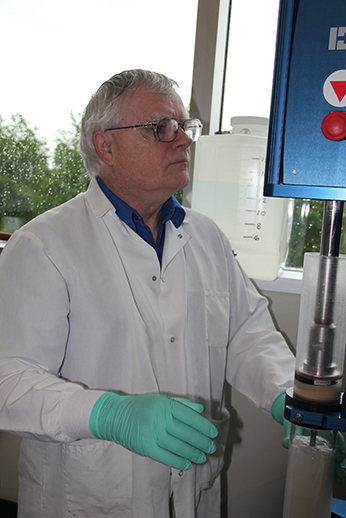
| June 2015 | |||||||||||
| Top stories | |||||||||||
| In the news | |||||||||||
| Photos | |||||||||||
| Contact us | |||||||||||
| Archive | |||||||||||
|
Lab testing Missouri water for Cryptosporidium |
The Hygienic Laboratory was awarded a six-year contract from the Missouri Department of Natural Resources to test for the presence of Cryptosporidium (crypto) in surface water. Source water monitoring for the large Missouri public water supplies began in April in accordance with the Long Term 2 Enhanced Surface Water Treatment Rule (LT2). The goal of this regulation is to reduce disease associated with crypto and other disease-causing microorganisms in drinking water.

John Kempf, environmental lab specialist, performs the elution stage of testing water for Cryptosporidium. The Hygienic Laboratory began testing for the microscopic parasite in April as part of a six-year grant with Missouri.
Ten-liter water samples or filters submitted for this testing have a holding time of 96 hours within which testing must begin to ensure accurate results. Samples are sent from Missouri using an overnight carrier service. The testing method entails four phases: concentration, elution, immunomagnetic separation and detection. This process usually takes a couple days to complete.
Crypto caused the nation’s largest drinking water outbreak in 1993 in Milwaukee that sickened approximately 403,000 people in two weeks.
The parasite can live in the intestines of infected animals. Millions of these parasites can be released into the environment from sewage or the feces of those infected.
Crypto is spread via the fecal-oral route (must be ingested) in many different ways. Because crypto has a cyst stage that is very small and resistant to chlorine, this microorganism is one of the leading causes of diarrhea-associated illness from swimming pools. Accidently drinking water while swimming in contaminated recreational water is the most common way to contract crypto. Other means of transmission include caring for an infected person or animal or ingesting contaminated food or water. Symptoms include frequent watery diarrhea, vomiting and fever, among other flu-like symptoms.
The Hygienic Laboratory has been approved by the EPA to test for crypto for regulatory purposes since 2002. Analysts must successfully complete an extensive training process, onsite audit and proficiency samples.